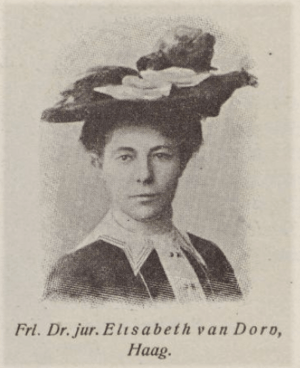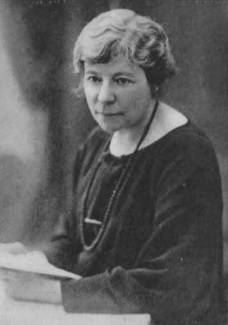Lizzy van Dorp facts for kids
Quick facts for kids
Elisabeth Carolina "Lizzy" van Dorp
|
|
|---|---|

Lizzy van Dorp (1904)
|
|
| Born | 5 September 1872 Arnhem, Netherlands
|
| Died | 6 September 1945 (aged 73) Banjoe Baroe, Java
|
| Nationality | Dutch |
| Alma mater | Leiden University |
| Occupation | Lawyer, economist, parliamentarian and feminist |
| Known for | First Dutch woman to earn a law degree |
| Parents |
|
Elisabeth Carolina "Lizzy" van Dorp was an amazing Dutch woman who lived from 1872 to 1945. She was a lawyer, an economist (someone who studies how money and resources work), a politician, and a feminist (someone who believes in equal rights for women). She achieved many important "firsts" for women in the Netherlands!
Contents
Early Life and Education
Lizzy van Dorp was born in Arnhem, Netherlands, on September 5, 1872. Her parents were Adriana Elisabeth Verdam and Gerard Carel Théophilus van Dorp.
Lizzy studied law at Leiden University. She was a very talented student. In 1900, she became the first leader of the Association of Female Students in Leiden. Just one year later, in 1901, she made history again. She became the very first woman in the Netherlands to earn a law degree!
In 1903, she earned her doctorate degree. This means she completed advanced studies and wrote a special paper. Her paper argued against a rule that tried to stop married women from working. Lizzy believed women should have the freedom to work, whether they were married or not.
Career and Activism
After finishing her studies, Lizzy van Dorp started working as a private lawyer. She quickly became well-known. In October 1903, she became the first female lawyer to appear before the Supreme Court. This is the highest court in the Netherlands. It was a huge step for women in law!
Lizzy was also very active in movements that supported women's rights. She believed strongly that women should have the right to vote. This is called female suffrage. She worked hard to make this happen in the Netherlands.
In 1915, Lizzy was invited to join the team that edited De Economist. This was a very important economics magazine in the Netherlands. She was the only woman among five male editors.
In the 1920s, Lizzy became interested in the political ideas of another liberal thinker, Samuel van Houten.
A Woman in Politics
In 1922, Lizzy van Dorp became a politician. She was elected to the House of Representatives of the States General. This is like being a member of parliament. She first represented the Liberal Party. Later, she supported the Liberal State Party.
Lizzy served in parliament from July 25, 1922, to September 15, 1925. During her time there, she worked hard for women's rights. She also wrote many articles and books about economic topics.
A Passion for Travel
After her mother passed away in 1935, Lizzy van Dorp moved to England. While living there, she wrote a book called A Simple Theory of Capital, Wages, Profit and Loss. This book shared her new ideas about how money and wealth are shared in society.
By the late 1930s, Lizzy became a keen traveler. She visited places like Switzerland and Turkey. In 1940, World War II had started. She decided it was too risky to go back to the Netherlands. A powerful person in the National Socialist Movement (who was close to the German occupiers) was someone Lizzy had often disagreed with.
Instead of returning home, Lizzy traveled to the Dutch East Indies. This was where her mother was born. It was also where her father had started a publishing company many years before.
Difficult Times: Internment
In 1941, Lizzy van Dorp was living in the Dutch East Indies. The Japanese forces occupied the area during World War II. Lizzy was taken and held in an internment camp. It is not clear why she did not leave the East Indies before this happened.
On her 72nd birthday in 1944, Lizzy received a special gift. It was a notebook from other women in the Tjihapit II camp in Bandung, West Java. The notebook was a collection of Indonesian recipes. The women in the camp had added their own recipes too. It was a thoughtful gift during a very difficult time.
Lizzy van Dorp sadly passed away on September 6, 1945. She died "of exhaustion" in the Banjoe Baroe camp on Java. This was a Japanese internment camp. She died just three weeks after the Japanese forces surrendered. It was also one day after her 73rd birthday. She had been held in the camp for more than three years.
Lizzy van Dorp is remembered as a pioneering woman who broke barriers in law, economics, and politics. She fought for women's rights and left an important mark on Dutch society.


